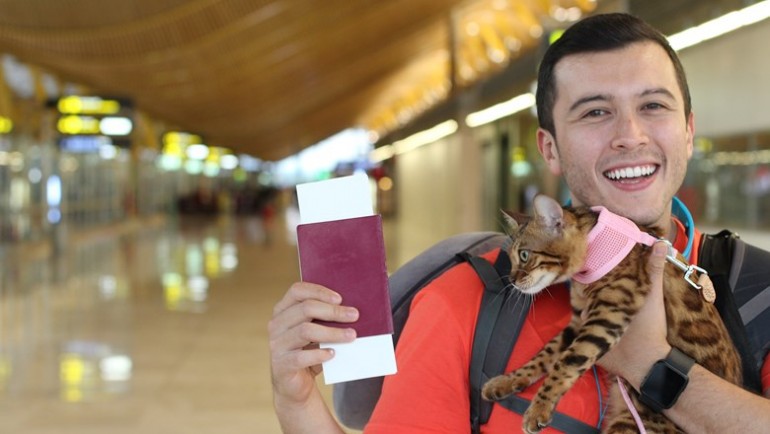Sponsored Listings:
The DOT is reviewing more than 4,400 public comments as it determines whether it should end a federal requirement that airlines allow passengers to bring emotional support animals (ESAs) onto flights.
No timeline has been set for completion of the decision process.
“The department’s next steps will be determined after completing the comment review and analysis,” a spokeswoman said.
As part of the rulemaking process, the DOT initiated a public review of ESA regulations in May after airlines complained that many flyers were abusing the rules by falsely claiming they needed their pets for emotional support. Doing so, airlines said, gives passengers an end run around fees the carriers charge for pet carriage, while also exempting those pets from requirements that they be kenneled during a flight.
Fees for carry-on pets on Delta, American and United are $125 one-way for a domestic flight, for example. If passengers check a pet, cargo fees are typically higher than that.
In some cases, airlines say, passengers have brought untrained animals onto planes, resulting in biting incidents and defecations in aircraft cabins.
In rare but sometimes highly publicized cases, passengers have attempted to use emotional support regulations in the most eccentric of manners. One example was the widely reported incident this past winter when a United customer tried to claim a peacock as an ESA.
Under current regulations, airlines can require passengers to present a letter from a mental health professional asserting that they need an ESA. Carriers must allow a wide variety of animals onto aircraft, though restrictions can be put on certain types of animals, such as snakes, rodents, spiders and ferrets, as well on individual animals that have exhibited threatening behavior or are deemed to be too large.

In its rulemaking, the DOT made it clear that it is not considering any changes to regulations requiring that airlines allow trained service dogs onto flights to assist disabled passengers. But rules related to ESAs could be significantly tightened.
The department could decide to restrict the definition of ESAs to dogs alone, while also limiting to only one the number of ESAs airlines must allow a qualified individual to bring onboard. It could also do away with support animal requirements entirely.
What the airlines want
That’s what the trade group Airlines for America (A4A) and Delta (which isn’t in A4A) are recommending. They want the DOT to adopt the Department of Justice definition, which holds that a service animal is a dog that is individually trained to perform a task for an individual with a disability. The definition includes no provision for ESAs.
In its official filing in the rulemaking docket, Delta said that it transported 163,000 ESAs in 2017, a 160% increase over 2015.
“Accommodating service and support animals has become a growing challenge for Delta and other U.S. airlines,” the carrier wrote. “Incidents have included animals running freely about the cabin; urinating and defecating; and engaging in aggressive behavior, such as barking, growling or biting.”
A4A said that industrywide the number of ESAs carried by U.S. airlines increased 57% in 2017 alone.
Airlines aren’t alone in pushing for stricter regulations. For example, the consumer advocacy group Travelers United endorsed A4A’s position in its DOT filing.
Still, if the DOT moves to limit ESAs, it will be doing so over vocal objections from many ESA supporters and users.
“Tiffany, our 4-year-old shih tzu, helps with my anxiety and depression when she travels with me,” a traveler named Sara Dennis wrote in her public comment for the rulemaking docket. “It would make it much more difficult if she wasn’t with me.”
Dennis’ position is echoed in online petitions that call out American for its opposition to ESAs. They also criticize American and other airlines for policy changes they have already made this year to toughen the procedure for flying with an ESA.
Starting with Delta in March, airlines began taking steps such as requiring customers traveling with a support animal to submit a signed veterinary health form 48 hours before the flight and requiring a signed confirmation that an animal is properly trained.
“What we’re calling out is that for some people an emotional support animal is necessary, it’s a lifeline, and especially for a long flight,” said Rebecca Gerber, senior director of engagement for Care2, an online petition website that supports progressive causes. “It’s something [airlines] need to figure out how to accommodate, and they will lose a lot of customers if they don’t figure out how to support folks with emotional support animals. It’s not a case of people just wanting their pet nearby. These animals are their lifeline.”
The Care2 petition against American garnered 60,000 signatures within a week. A Care2 petition in June objecting to Delta’s new policy of not accepting “pit bull-like dogs” as service or support animals had drawn 114,000 signatures as of late last week.
That Delta rule appears to violate existing DOT regulations.
In an email last week, a DOT spokeswoman wrote, “A limitation based exclusively on breed of the service animal is not allowed under the department’s Air Carrier Access Act regulation.”
In their arguments opposing ESAs, airlines say the provisions are being abused.
A4A wrote in its public filing, “Large numbers of individuals who do not have a disability are seeking to travel with untrained animals (typically but not always pets) in the aircraft cabin based on a claim that these are ESAs.”
Indeed, a Google search for “ESA letter” reveals several websites offering, sight unseen, letters from mental health professionals attesting to one’s need for an ESA.
A site that offers same-day delivery of such a letter for $55, states, “An ESA letter from a licensed therapist is all you need to gain legal access to airline cabins and pet-restricted housing without extra fees and deposits.”
Some sites even offer a 100% money-back guarantee.
Source: travelweekly.com










